ENCOURAGEMENT AWARD, MAY 2017
ATA Scientific would like to thank all those that participated in our May 2017 Encouragement Award.
The topic of our latest competition was focused climate change and how we can develop innovations to minimise the negative effects. Selecting just three winners from the huge number of entries received was not an easy task. After carefully reviewing each one, we soon realised they were all worthy of the prize. While many chose to discuss mitigation strategies including reducing fossil fuel use, planting more trees, reducing waste, others considered quite novel and innovative solutions to achieve significant greenhouse gas reductions. It’s clear there is no single solution to global warming, however the choices we make in our day-to-day life — how we get around, what we eat, how we live — play a major role. Thank you to all those that participated in our competition and sent in their entries.
If you would like to get involved in reducing greenhouse gas emissions too, contact your political representatives and tell them you want immediate action on climate change.
OUR WINNERS
Three entries were selected to receive our award– first prize at $1500 and 2 runners up at $600 each.
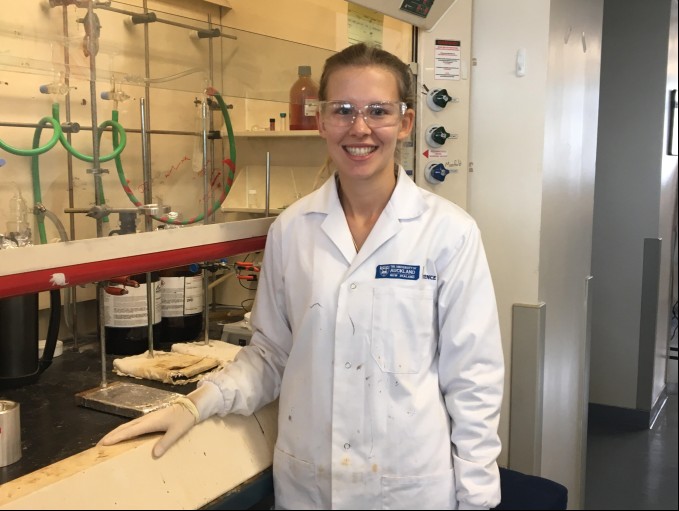
Congratulations to our first prize winner, Magdalena Kohut, PhD student at the University of Auckland studying Organic Synthetic Chemistry. Magdalena works under the supervision of Associate Professor Jonathan Sperry. Her research is mainly focused on the development of iridium-catalysed C-H activation methodology and its applications in natural product synthesis.
Magdalena recently completed her Master’s project in the labs of GlaxoSmithKline, a major pharmaceutical company. A summer internship in a medicinal chemistry group enabled her to understand the processes involved in drug discovery including the decision pathways used to assess and develop promising candidates. Through this experience, Magdalena was able to explore novel chemical space to further efforts towards a first-in-class therapy for an aggressive cancer cell line.
“My present research interests lie in small molecule synthesis with potential medicinally important activity. Throughout my future career as a broad goal I am determined to carry on searching for applications of science to benefit society, at the same time addressing the challenges of sustainable research and development. I seek a future as part of the bio-economy and am keen to learn about how academic research is commercialised”
Magdalena will use the award to help fund her travel and participation as one of 100 Leaders of Tomorrow at the Gap Summit conference at Georgetown University on 6th – 10th June 2017. The Gap Summit is a prestigious invite-only conference from which Magdalena was selected from a large pool of applicants. It will allow her contribute to discussions regarding the current global bio-economy and the grand challenges within the biotech industry. Listening to and meeting biotech CEOs, policy makers and research pioneers will give her a new perspective to her current and future work.
To read more about this conference visit http://dev.globalbiotechrevolution.com/events/gapsummit-2017/
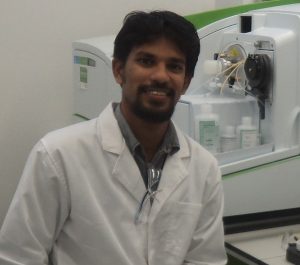 Congratulations to our runner up, Hasintha Wijesekara, a PhD student to the Global Centre for Environmental Remediation (GCER), The University of Newcastle. Hasintha works under the supervision of Professor Nanthi Bolan, Professor of Environmental Chemistry at The University of Newcastle.
Congratulations to our runner up, Hasintha Wijesekara, a PhD student to the Global Centre for Environmental Remediation (GCER), The University of Newcastle. Hasintha works under the supervision of Professor Nanthi Bolan, Professor of Environmental Chemistry at The University of Newcastle.
His research is focused on understanding the biogeochemical mechanisms of biosolids application on carbon sequestration in soils. He uses biosolids which is treated sewage sludge to limit greenhouse gas emission and enhance soil carbon sequestration.
In his research, he has been able to modify biosolids with an effective nano-scale stabilisation process with two industrial waste materials: Fly Ash from coal fired power stations and Red Mud from Bauxite refining. These industrial wastes contain certain types of nano-clay minerals. When mixed with biosolids, these tiny minerals bond strongly with carbon through a series of strong chemical and physical associations, protecting it from microbial degradation, and thereby preventing a significant amount of carbon from escaping the soil. The outcomes of this research show the opportunities to implement this strategy in field scale, and thereby “Building Soil Carbon Credits with Nanostabilised Biosoilds” in the future.
Hasintha plans to use his award to attend the International Annual Meeting for the Soil Science Society of America, “Managing Global Resources for a Secure Future”, Tampa Convention Center, Tampa, Florida, USA, October 22-25, 2017.
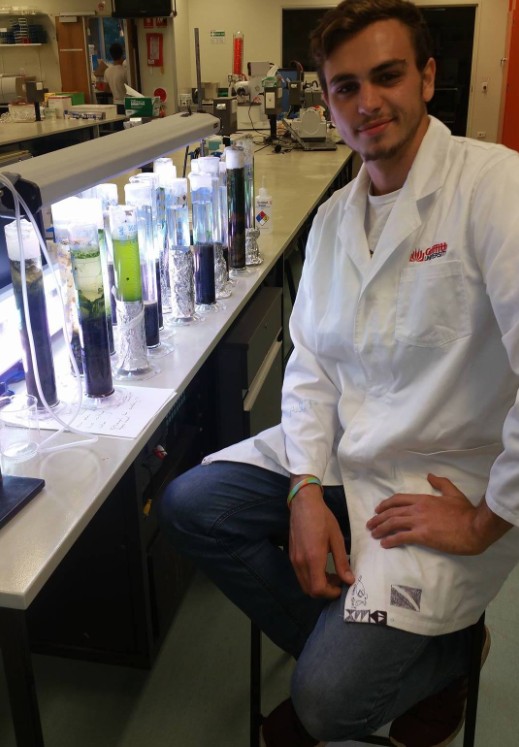 Congratulations to our runner up, Rahd Youakim, an aspiring second year student, Studying Marine science and majoring in Coastal Physical sciences at Griffith University.
Congratulations to our runner up, Rahd Youakim, an aspiring second year student, Studying Marine science and majoring in Coastal Physical sciences at Griffith University.
Rahd is an active conservationist. His career goal is to be one of the leading figures in Australia for sustainable fishing aquaculture practices. He plans to establish his own research groups, one in each state along the east coast of Australia exploring different temporal environments and maximising the yield production for each zone with minimal to zero impact.
“A big dream yes I know! But my mum once told me that we are always destined to be the best person we can be and showed me the way to inner-happiness is to give more than you take”.
“All I want ultimately is the world’s oceans to be as healthy as they were 200 years ago. When all this comes together in the next 20 years I hope to use mine and others expertise re-stock the oceans with species that are on the brink of extinction”.
Rahd plans to use his award to contribute to his tuition costs which will assist with achieving his career goals and implementing his ideas in the future. He plans to purchase an aquaculture/ aquaponics system which will consist of a 2ft, 3ft and 4ft fish tank with filters, heaters etc. With the skills and knowledge gained from his studies, he would like to conduct his own experiments so that he can one day present his findings for every type of environment and implement these to ensure the best sustainable practices.
We would like to thank all those that participated. The next Encouragement Award will be posted on our website soon.
For more information or to stay informed of other upcoming promotions please ‘Like us” on Facebook or contact us.
Contact usSPIN TO WIN at Lorne Proteins 2017
ATA Scientific hosted the ‘SPIN TO WIN” Young Scientist prize once again at the annual Lorne Protein Structure and Function conference (5-9 Feb 2017). Delegates arrived at our booth in full optimism to spin the wheel and win. Many were awarded prizes such as wine, torches and lab timers. Still, the most popular and sought after prize on the board was our $2000 Young Scientist Award.
After a final nail-biting round and three finalists, our winner was announced.
Congratulations to Hannah McKerchar, PhD student from the University of Canterbury, School of biological sciences, Biochemistry – winner of the $2000 Travel Award ‘Spin to Win’ Prize!
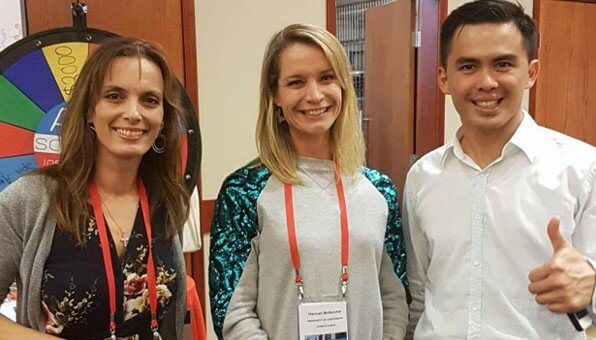
“This award will enable me to present our research into crosslinks formed in processed food at international conferences and will provide an opportunity to connect and collaborate with others in the field”.
Hannah’s research team focuses on proteomics and mass spectrometry in food proteins. Her project looks at how crosslinks, that play a role in a protein’s structure, affect the function of protein after it is processed. Although crosslinking provides a means by which the food industry can manipulate the functional properties of food, many types of crosslinks are not well understood and there is no routine method of analysis. By investigating these crosslinks that form in food proteins, physical and chemical properties such as the texture, colour, flavour and nutritional value of food may be determined which will assist further understanding in food science processing, food assurance and food safety.
Hannah plans to use the $2000 award on attending future mass spectrometry and food science conferences to present data, share ideas and meet other people in the field. Two conferences that are of particular interest include the Australia and New Zealand Society for Mass Spectrometry Conference, being held in Adelaide on 16th to 20th of July 2017 and the American Society for Mass Spectrometry Annual Conference, 4-8 June 2017 in Indianapolis.
The ATA Scientific Young Scientist Travel Award, which was started in 2011, was set up to offer young scientists financial assistance to further their education and to attend scientific conferences and meetings around the world. The award is open to PhD candidates and/or scientists aged 30 years or younger. By setting an age limit we give early career scientists access to financial assistance to enable them to collaborate with peers at scientific meetings such as the Lorne Proteins conference, and to launch their careers within their field of study.
Over the past 5 years ATA Scientific have awarded the Young scientist travel prize to more than 45 winners from multiple Universities and research organisations around Australia and New Zealand. For more information regarding our award or to enter the next promotion contact us or visit https://www.atascientific.com.au/eventsandtraining/awards/
Contact usATA Scientific Travel Award Winners – Nov 2011
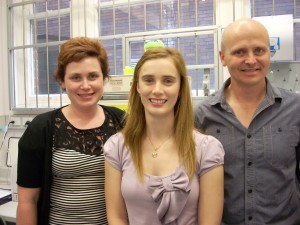
ATA Scientific would like to thank all those that participated in our recent Travel Award promotion held in October this year. Congratulations to our first prize winner Ms Amelia Edington, a PhD Pharmacology student earning her degree at the University of Sydney, under her supervisors A/Prof Renae Ryan and Prof Robert Vanderberg. Research in the Transporter Biology Group that Amelia is a member of, is focused on understanding the molecular basis for neurotransmitter transporter functions in the central nervous system and how this can be manipulated by endogenous regulators and pharmacological agents.
Excited to be awarded the prize, Amelia told ATA Scientific “It is fantastic to now have the opportunity to be able to attend a scientific meeting where I can present my research and meet other researchers in my field… Thank you so much”
The winning article submitted by Amelia was in response to our question “What I consider the most interesting or significant discovery/development during the 12 months in the field of science that I work”and is attached here.
In addition to our first prize winner, two runner up prizes were awarded. Congratulations to:
Jing Zhong LUK (PhD student, School of Chemistry and Molecular Biosciences, University of Queensland)Read article
Emma Rath (PhD Student, ANSTO National Deuteration Facility and University of Sydney, Faculty of Pharmacy) Read article
For more information or to stay informed of other upcoming promotions please ‘Like us” on Facebook or contact us.
Contact usATA Scientific Travel Award Winners – Feb 2012
This year, the decision for our Jan 2012 Travel Award winners was not an easy one with many great articles submitted. We would like to thank all those that participated. The next Travel Award for Feb/Mar 2012 is now open and available on our website. Please click here for further information.

Congratulations to our first prize winner Ms Celeste Donato, a PhD Scholar at Murdoch Childrens Research Institute, earning her degree from La Trobe University, under her supervisor A/Prof Carl Kirkwood. The Enteric Virus Research Group that Celeste is a member of investigates viral pathogens and their role in several gastrointestinal diseases important in children, including acute gastroenteritis and Crohn’s disease.
Excited to be awarded the prize, Celeste told ATA Scientific these funds will be used to assist her in attending the 11th International Symposium of double stranded RNA viruses to be held in November 2012.
The winning article submitted by Celeste was in response to our competition focused on an imaginary letter to the Minster for Science and is
attached here.
Congratulations to our second prize winner Ivan Wong (PhD student, School of Biotechnology and Biomolecular Sciences, The University of New South Wales; Supervisor Prof Brett Neilan ) Read article
For more information or to stay informed of other upcoming promotions please ‘Like us” on Facebook or contact us.
Contact usATA Scientific Travel Award Winners – Apr 2012
ATA Scientific would like to thank all those that participated in the Feb/Mar issue of our Travel Award promotion. After receiving an overwhelming response two winners were announced.
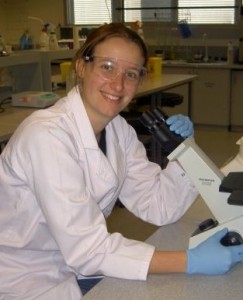
Congratulations to our first prize winner Miss Crystal Naudin, a second year PhD student with the Experimental Oncology unit at Newcastle University. Crystal works with her supervisor Dr Jude Weidenhofer, Research Fellow at the School of Biomedical Sciences & Pharmacy, University of Newcastle.
Researchers at the school that Crystal is a member of are primarily concerned with the study of cancer cell biology and the genetic basis of human diseases. Crystal is currently working on a family of cell membrane proteins called Tetraspanins. A recent mouse model generated in Crystal’s laboratory, in which one of the Tetraspanin genes (CD151) was knocked out, unexpectedly developed a severe early onset of kidney disease. As a result Crystal is working on determining the role of the CD151 molecule in kidney function.
When advised of her prize, Crystal told ATA Scientific“That is awesome. So excited. That should definitely cover registration and accommodation for the Tetraspanin conference!!“ This is the just the second time Crystal had entered one of our competitions. Crystal will present her work at the 5th European Tetraspanin Meeting in Nijmegen, The Netherlands from 26th-28th of September this year.
Congratulations to our second prize winner Fanny de Busserolles, PhD candidate at the School of Animal Biology (Neuroecology and Behaviour) and The Ocean Institute at the University of Western Australia. The group is involved in studying the sensory systems of a wide range of animals such as birds, reptiles, mammals, fish, sharks etc. Fanny’s research focuses on the visual system the lanternfish family, a family of deep-sea fish. Her work looks at gaining a better understanding of fish visual adaptations to their environment and in this particular case how the visual system of these species have adapted to see in dark conditions and for viewing biololuminescence in the deep-sea.
The prize money will be used towards Fanny attending the 2012 Australian Marine Science Society Association (AMSA) Conference (‘Marine Extremes and Everything in between’) to be held in Hobart in July 2012. Fanny will be talking about her exciting science on viewing bioluminescence by lanternfish in the deep-sea.
We would like to thank all those that participated. The next Travel Award for April/May 2012 is now available on our website.
For more information or to stay informed of other upcoming promotions please ‘Like us” on Facebook or contact us.
Contact usATA Scientific Travel Award winners – Jun 2012
ATA Scientific would like to thank all those that participated in the Apr/May issue of our Travel Award promotion.

Congratulations to our first prize winner Miss Bianca M. Blunden, PhD candidate at The University of New South Wales, School of Chemical Engineering, Centre for Advanced Macromolecular Design under her supervisor Prof Martina H.Stenzel.
Bianca’s project is primarily focused on the study of the attachment of ruthenium complexes to polymers. “We are aiming to develop macromolecular ruthenium complexes that are viable anti-cancer drugs.” Is it proposed that the attachment of these complexes to polymers will further increase their benefits as anticancer agents since diseased tissue has an endothelial layer of blood vessels that is more porous to large molecules and does not generally have a lymphatic drainage system.
Bianca plans to use her award to assist her in attending the 76th Prague Meeting on Macromolecules being held on 1−5 July 2012 and to help her cover the expenses for her current research exchange in Europe. Bianca is currently overseas in Germany testing the cell uptake efficiency of the ruthenium polymers.

Congratulations to our second prize winner Mr Matthew Leonard, PhD candidate at RMIT University, School Applied Sciences, Chemistry discipline, Organic synthesis group under his supervisor A/Prof.Helmut Hügel.
Matthew Gordon Research Conference 2012 2 21 300×279 ATA Scientific Travel Award winners Jun 2012His laboratory is dedicated to the study of fundamental chemical synthesis through the application and auspices of natural product based medicinal compounds. Matthew is in his second year of his PhD candidature researching novel green chemical syntheses of non steroidal antiandrogens such as RU 58841 and related novel structures that are effective for the treatment of alopecia (baldness), hirsutism (excessive hairiness in females) and acne. For example, RU58841 has a short half-life of less than 1h, therefore topical application not only avoids the extensive hepatic metabolism (N-dealkylation) but also provides for effective regional treatment without systemic antiandrogen activity due to the formation of active metabolite.
“Thank you so much, it means a lot to me to be recognized and supported in these kind of endeavours”, said Matthew upon receiving the news.
Matthew plans to use his prize money to attend the Gordon Research conference on Heterocyclic compounds in Newport, Rhode Island on 24-29 June 2012 and also to attend a scientific development meeting with Advion instruments in Ithaca, New York on 20-Jun-2012 to observe their new compact mass spectrometer.
We would like to thank all those that participated. The next Travel Award for Jun/Jul 2012 is now available on our website.
For more information or to stay informed of other upcoming promotions please ‘Like us” on Facebook or contact us.
Contact us



 02 9541 3500
02 9541 3500